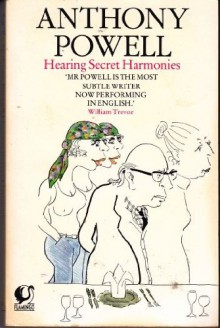
It's curious to consider that when Anthony Powell wrote Hearing Secret Harmonies the final novel in the twelve-novel series “A Dance to the Music of Time”, and despite the series starting in the early twentieth century, that it was almost contemporaneous, being published in 1975, and taking place in the late 1960s and early 1970s, and makes references to hippies, the permissive society, Vietnam, and Enoch Powell.
The final two volumes, Temporary Kings and Hearing Secret Harmonies, each moving the narrative forward by around ten years, allows for some dramatic changes to have occurred, the most notable change is in Widmerpool whose trajectory dramatically changes in ways that would be difficult for anyone to imagine earlier in the series.
Anthony Powell finished the series with a real flourish. Hearing Secret Harmonies embraces the late sixties counterculture and contains some truly stunning scenes. He also manages to introduce yet more new characters, including the memorable Scorpio Murtlock and his Harmony cult.
Overall “A Dance to the Music of Time” is magnificent. Reading the series has been such a fabulous experience. Anthony Powellis a master. Although the books can be read and enjoyed individually, and on their own terms, the real pleasure is in reading all twelve books, and enjoying a narrative that takes place over a seventy year time span. Calling his series ''A Dance" is a perfect metaphor, as Anthony Powell is akin to a choreographer, who intricately keeps track of over four hundred characters across more than a million words. It's a stunning achievement, and throughout, his beautiful writing is as much of a joy as the ingenious plot and his ambitious, and completely successful, cultural and social history of England throughout the twentieth century.
The star of the series is arguably Kenneth Widmerpool, one of the most memorable characters I have ever encountered in a book. Widmerpool is a contemporary of narrator Nick Jenkins and, despite not being friends, he crops up somewhere in every volume. Whilst narrator Nick, along with many of the characters, represent musicians, poets, novelists, painters etc., Widmerpool is the opposite, a ruthlessly ambitious person but a deeply flawed human being. I wonder to what extent he might represent the triumph of commerce and bureaucracy, over more aesthetic considerations, that appears to be one of the main aspects of twentieth century history.
Whilst reading it I have had a copy of "Invitation To The Dance" by Hilary Spurling which is a wonderful reference book, particularly when I needed reminding about a character who had just reappeared. Now I have finished the series I plan to read the whole of "Invitation To The Dance" as it clearly contains lots of other useful and interesting information. I also have a copy of To Keep the Ball Rolling: The Memoirs of Anthony Powell which looks like another wonderful book and, according to the cover, is "especially illuminating to students ofA Dance to the Music of Time". I am really looking forward to reading both, in addition to re-reading this marvellous series again.
“A Dance to the Music of Time” is a masterpiece - and one of the best literary experiences I have ever enjoyed. Profound, funny, dramatic, and remarkably accessible and easy to read. It is a series I will return to again. I cannot praise it highly enough.

 Log in with Facebook
Log in with Facebook 






